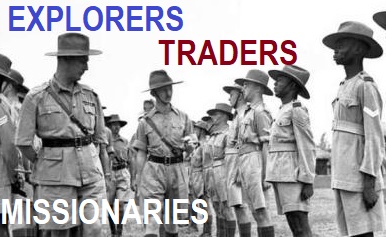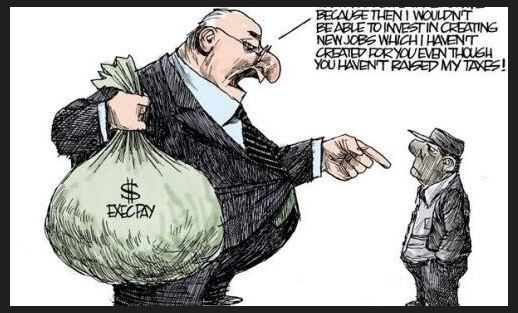AGENTS OF COLONIALISM (INDUSTRIAL CAPITALISM)
Colonialism is the direct and overall domination of one country by another on the basis of state power being in the hands of a foreign power (For example, the direct and overall domination of Nigeria by Britain between 1900-1960).
The first objective of colonialism is political domination. Its second objective is to make possible the exploitation of the colonized country
Colonialism began as a result of changes in the mode of production in Europe (For example, the emergence of industrial revolution). The industrial revolution ushered in a new process of production in place of the earlier slave-based economy.
The industrial revolution was a revolutionary trend in the history of mankind. The problem of how to lubricate machineries came up with the emergence of the industrial revolution.
The slave trade and slavery have by this time fulfilled their basic function of providing the primitive capital. The quest for the investment of the accumulated capital and the need for raw materials led to the colonization of Africa.
AGENTS OF COLONIALISM (INDUSTRIAL CAPITALISM)
There were about three groups of agents of industrial capitalism in Africa namely:
- Explorers
- Missionaries
- Traders

1. EXPLORERS
During the 19th century, the major aim of European powers was the exploration of Africa. The journey of exploration was financed and supported by European capitalists
In east Africa, exploration was done by the prominent explores such as Speke, Burton, Grant, Samuel Baker, Henry Molton Stanley and Dr. Livingstone
In central Africa and parts of Congo the prominent explorers were Dr. Livingstone and later Henry M. Stanley.
In West Africa the prominent explorers included Richard Lander, Dr. Barth Mungo Park, Clapperton, Dr. Baikie, Gaspard Mollien and Cailie.
The main aim was
To gather information about Africa because they needed a wider knowledge of the continent
They also wanted to know about the raw materials which African had to sell and the location of the main centers of population
They were interested in the knowledge of transport potentialities of African great river systems. For example, the British explorer, Mungo Park in 1780s, followed by Clapperton and Richard Lander explored the Niger and gathered important information about the economy and politics of West Africa.
THE ROLE PLAYED BY EXPLORERS IN THE COLONISATION OF AFRICA
1. They reported back about the potentialities of the African resources
Clapperton reported about the river Niger to the British government while Speke reported about the potentiality of Lake Victoria and named it Victoria to honor Queen Victoria of the United Kingdom.
2. They provided important information about the nature of African societies
They reported about the hostility, calmness and hospitality of the African people. This information played a central role for the European colonialists during the decision making process regarding the colonization of Africa.
3. They explored important mountains and researched the geology
Climatic conditions, topography, lakes and animal species in Africa. This knowledge later attracted European powers to colonize Africa.
4. They provided messages to their government about the evils of slave trade
The areas where slave trade was still conducted. Dr. Livingstone’s third journey through Tanganyika and Lake Regions of central Africa was targeted for that as a result he informed the English that the Yao’s land was still characterized by slave raids and the effects of slave trade such as sufferings, insecurity.
2. MISSIONARIES
By the 19th century, missionary activities had started in Africa. The pioneers were the protestant churches of Europe and America. It was only later that Roman arrived especially from France.
The domination of missionaries were the London missionary society, the church missionary society, Roman Catholic missionary society and the universities mission to central Africa (UMCA). Few Christian missionaries were directly active agents of imperialism.
They were essential ingredients of the increasingly assertive European access to Africa. However, in most cases European Christian played an important role in promoting and shaping the advent of European capitalism.
THE ROLE PLAYED BY MISSIONARIES IN THE COLONISATION OF AFRICA
1. They acted as interpreters and propagandists at the time of treaty making
Moffat stayed among the Ndebele for about 30 years serving the British South African company (BSACO) for treaty making between the companies (BSAC) and King Lobengula.
2. They acted as advisors to African chiefs
The British missionaries of the church missionary society convinced Kabaka to accept protectorate.
3. They introduced Western civilization to the interior through education
This aimed to prepare people of low ranks to serving colonial masters at the time of colonization.
4. They softened the minds and the hearts of Africans
Their activities were influenced by European imperialists’ interests by preaching and emphasizing the spiritual beliefs such as “give to God what which belongs to God,” and “give to Ceaser what belongs to Ceaser”. In the long run this preaching weakened African opposition and shaped the regions for future colonial administration.
5. They converted Africans to the new faith
They were easily employed as puppets to extend colonial rule. Typical examples are the converts of Sierra Leone, Nigeria and Ghana who were able to protect the British economic interests and paved the way for future colonization by the British.
6. They reduced resistance among African societies
This was done by converting some societies and preaching obedience to administrators.
7. They Introduced new crops
Horner grew coffee at Bagamoyo around 1870s the church missionaries society grew cotton in Uganda. This prepared people to acquire the skills, which were important for future cash crop production during the colonial era.
8. They helped in the abolition of slave trade
They planned for successful Christianization of the freed slaves as they preached the word of God. They wanted to create the conducive and peaceful environment for the development of legitimate trade which was exploitative in nature and was after capitalists’ interests.
9. They had closer links with rulers and interfered even in political matters
They allied European imperialism while they were working in the interior of Africa. This situation provoked the hostility from African rulers. In this case, missionaries appealed strongly for the protection from their home governments, which later led to effective colonization.

3. TRADERS
Traders were among the first Europeans to visit the interior and coastal areas of Africa. They came under the influence of capitalists who also supported missionaries and explorers.
Their main aim was to exploit the new sources of raw materials, markets and new areas in which industrial capitalists had to invest their capital. Examples of traders are William Mackinnon, James Stevenson, Harry Johnston and Carl Peters.
THE ROLE PLAYED BY TRADERS IN THE COLONISATION OF AFRICA
1. They opened a new an exploitative system
Africa became the target for European interests. This resulted in stiff rivalries and competition among European industrial nations.
2. They introduced legitimate trade
This involved the importation of European manufactured goods. Thus, the chain of dependence was created and the African local industries and the arts were destroyed.
3. They exposed Africa to the world capitalist system of economy
The use of currency, banking and credit facilities began to be witnessed by Africans. This resulted into exploitation of African resources. The fair and quick turns obtained by traders attracted European colonialists to come into Africa.
4. They opened communication systems
This laid the foundation for future colonial infrastructure. For example, the road from Lake Nyasa to Tanganyika known as Livingstone road was opened by traders and was used during the colonial administration.

































































